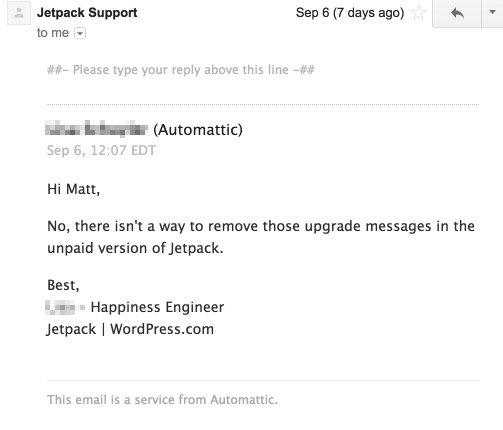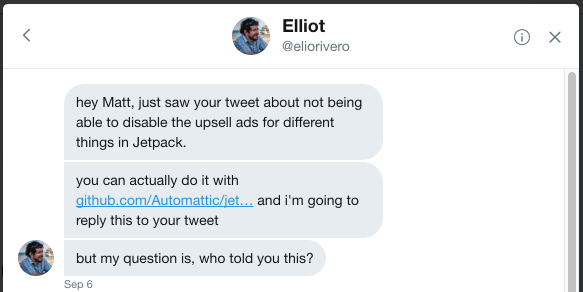We live in a world of monetized Jetpack.
Gone are the days where commercialized plugins were looked at under a watchful microscope, and leadership at Automattic felt that charging for plugins was, well, plain wrong. Today we’re seeing Jetpack as the revenue bridge between .org and .com offerings — and a very big bridge at that.
A reading episode of this article:
[ss_player]
As the Jetpack team continues to sharpen its marketing fangs around the plugin’s messaging, we’ve seen more meat on the bones of upsell nags.
See, I’ve received an uptick of customers and friends I’ve helped onboard to WordPress, question its security. Why? Because Jetpack is prompting to upgrade users to their paid backup and security services.
Obviously, I have mixed feelings about this, of which, I’ll save for the end of this post. For now, here’s how you can turn off those nagging Jetpack upsell ads.
CODE to disable Jetpack upsell ads
TL;DR (Sorry, you’ll need to get out your text editor for this one.) Look inside jetpack/class.jetpack-jitm.php, for the filter ‘jetpack_just_in_time_msgs’ See this GitHub link.
Use this code in your functions.php file:
add_filter( 'jetpack_just_in_time_msgs', '_return_false' );
It won’t come easy for the non-technical user to disable these ads, you can’t simply click a button to squelch these pesky messages. How do I know? After poking around through the nooks and cranny’s of the options pages, and expressing my displeasure on Twitter, I took to Jetpack’s official support channel.
A Happiness Engineer responded, at first thinking, I wanted to disable the ads of their monetization network — it’s like a Google AdWords — but for WordPress. After making it clear I wanted to disable the upsell nags, she responded with: Hi Matt, no there isn’t a way to remove those upgrade messages in the unpaid version of Jetpack.

Huh, not possible on the free version. Got it. So again, I expressed my frustration on Twitter, a tweet I’ve since redacted because Elliot reached out to me to set the record straight:

Glorious! So you CAN disable these upsells, through a filter for “just in time messages.”
A clever name, really, seeing the messages pop-up “just in time” of the users most aware time on screen, a clickable action. Most notable is when the user publishes a new post, and they are presented with making sure their website is securely backed up, conveniently pointing them towards the Jetpack Pro pricing grid
So there you have it, if you’re sick of Jetpack upsell nags, you can edit the code and it will all go away…for now.
Why is this a big deal; what the 1% of 1% care about
For most people, it’s a “who cares?!” situation, but, for those of us in the product & service space, it’s an irritating issue.
Let me get this out of the way first: I’m not disparaging the plugin, or the people behind it because I think there’s a need for Jetpack. I do understand that Jetpack is a business, even if it was never formally announced or perceived as one — and that’s the crux.
Issue #1 is it’s an Automattic business, tied too closely to the WordPress brand.
“An Automattic airline powering WordPress.com”
as their tagline reads, with the little WordPress logo next to it.
For a massive majority of people, that means it’s WordPress, and WordPress is telling them they need to buy something.
Issue #2 is when you already have these solutions in place, non-technical users receive a turbulent experience on that airline. As a consultant who recommends the best WordPress hosting, hosting that does all the backup and security for you, a client now thinks I lead them down the wrong path. The very least, it makes them stop what they’re doing, question security, and shoot me an e-mail.
Now everyone’s time is being consumed for something that isn’t truly urgent. Then the upsell ad, yeah, it becomes the definition of a nag, because without disabling it, it just repeats itself.
From a plugin owner perspective, that is, someone who makes money selling code — excuse me: support — that provides features otherwise not provided in WordPress, Jetpack is the 1-ton Gorilla in the room.
What once started as a jack-of-all-trades plugin which seemed to soften the blow of some missing core features, has become an all-you-can-eat buffet of bells and whistles. From CDN to backup, to contact forms, to themes, Jetpack is poised to become the marketplace plugin, a concept which WordPress.org repo banned since the early days.
So it’s not the fact that Jetpack is a business, or that they are charging money, it’s just — well — I wish they just came out with it. And when you have that kind of brand leverage, whether it’s fair or not, heck even legal — it’s frustrating.
If you grew up as a “blue collar” product owner in the space like I did, you feel beat down from the days of submitting themes for approval, only to get rejected for upsell links, or promoting a pro upgrade. A frustration that is amplified by the overall lack of wanting to actually pay for a well-coded plugin.
It’s hard to make money in the product space, and sometimes you feel slighted for it. Users just want everything for free, because WordPress is free, and then if you ever spent any time promoting a paid solution to the overall community, even volunteers in the space, they look at you like you’re trying to rob a bank.
Then along comes the “most recommended plugin” on the .org list, because it’s Automattic’s, and they show up like charging for that pro version — is no big deal. Remember that feeling from when you were a kid and you cleaned the whole house from top to bottom, only to have your parents walk in with your little brother holding the broom, and he got all the credit — yeah, it’s like that.
Meh.
Anyway, since I can feel the burning stares from the Jetpack fans, I’ll repeat: nothing against Jetpack or the team behind it, Jetpack, along with Gutenberg, is changing not just the platform — but the very economics of our industry.
It’s not happenstance, just think of all the amazing Gutenberg layouts you’ll be able to buy straight from Jetpack.


Leave a Reply